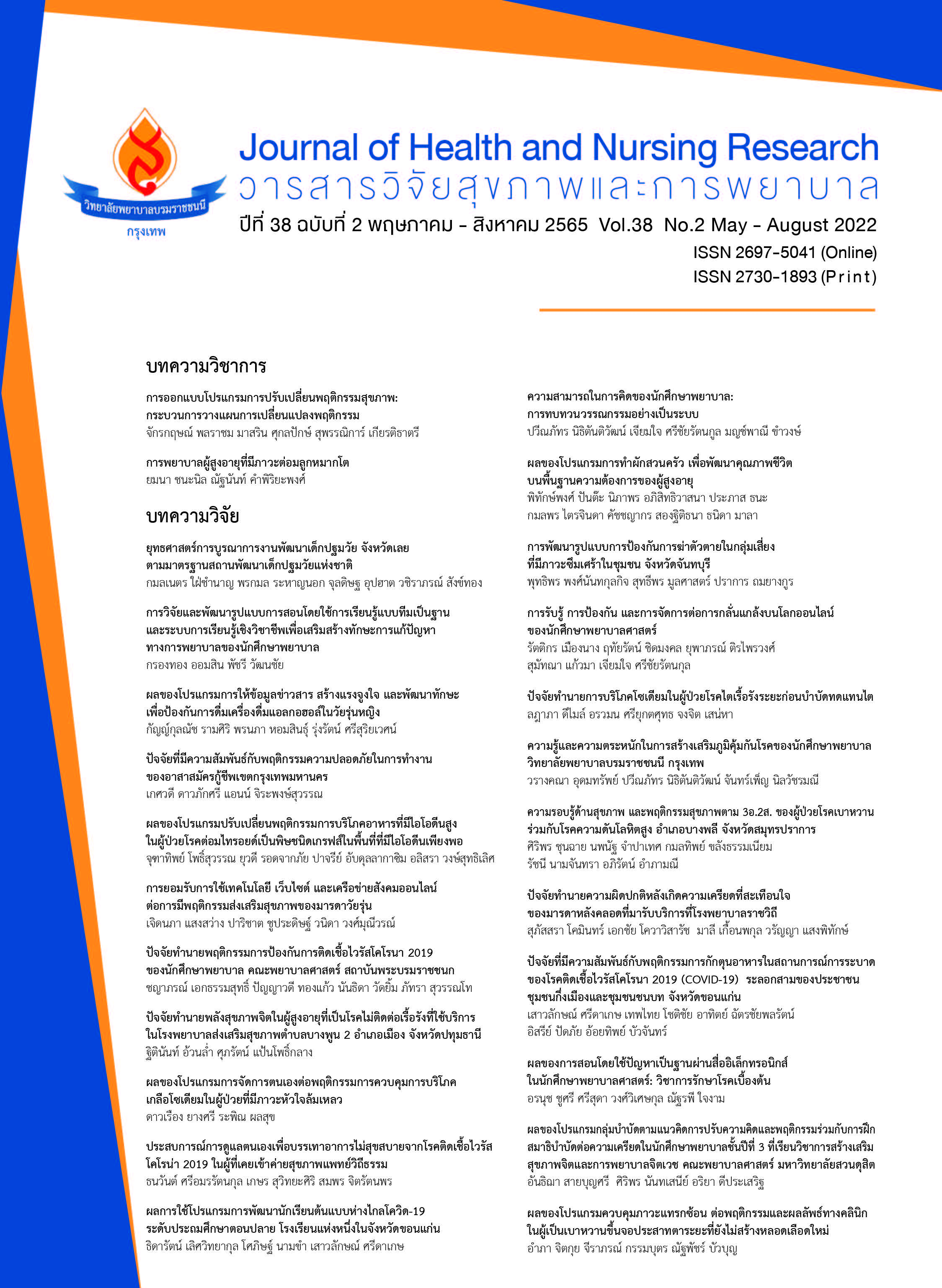ปัจจัยทำนายพลังสุขภาพจิตในผู้สูงอายุที่เป็นโรคไม่ติดต่อเรื้อรังที่ใช้บริการในโรงพยาบาลส่งเสริมสุขภาพตำบลบางพูน 2 อำเภอเมือง จังหวัดปทุมธานี
คำสำคัญ:
ปัจจัยทำนาย , พลังสุขภาพจิต, ผู้สูงอายุ, โรคไม่ติดต่อเรื้อรังบทคัดย่อ
บทนำ: ผู้สูงอายุที่เป็นโรคไม่ติดต่อเรื้อรังจะประสบปัญหาเกี่ยวกับภาวะแทรกซ้อนทั้งด้านร่างกายและจิตใจ หากได้รับการสนับสนุนให้มีพลังสุขภาพจิตที่ดี จะส่งผลให้ผู้สูงอายุสามารถปรับตัวต่อภาวะการเจ็บป่วยและสถานการณ์ที่ยากลำบากในชีวิตได้ ปัจจัยที่เกี่ยวข้องกับพลังสุขภาพจิตจึงมีความสำคัญ
วัตถุประสงค์การวิจัย: เพื่อศึกษาปัจจัยทำนายพลังสุขภาพจิตในผู้สูงอายุที่เป็นโรคไม่ติดต่อเรื้อรัง
ระเบียบวิธีวิจัย: การวิจัยความสัมพันธ์เชิงทำนาย กลุ่มตัวอย่าง คือ ผู้สูงอายุที่เป็นโรคไม่ติดต่อเรื้อรังที่ใช้บริการในโรงพยาบาลส่งเสริมสุขภาพตำบลบางพูน 2 จังหวัดปทุมธานี จำนวน 150 คน คัดเลือกโดยใช้วิธีการสุ่มอย่างง่าย เครื่องมือที่ใช้เป็นแบบสอบถาม ประกอบด้วย ข้อมูลส่วนบุคคล การรับรู้ภาวะสุขภาพ การสนับสนุนทางสังคม ความสามารถในการปฏิบัติกิจวัตรประจำวัน การเผชิญปัญหา ขวัญและกำลังใจ และพลังสุขภาพจิต มีค่าความเที่ยงเท่ากับ .83, .98, .93, .98, .91 และ .98 ตามลำดับ วิเคราะห์ข้อมูลโดยใช้สถิติเชิงพรรณนาและสถิติการถดถอยพหุคูณแบบขั้นตอน
ผลการวิจัย: พบว่ากลุ่มตัวอย่างมีคะแนนเฉลี่ยพลังสุขภาพจิตอยู่ในระดับสูง (M= 160.73, SD= 18.17) ความสามารถในการปฏิบัติกิจวัตรประจำวัน การมีขวัญและกำลังใจ การสนับสนุนทางสังคม การรับรู้ภาวะสุขภาพ และความเพียงพอของรายได้ สามารถร่วมทำนายพลังสุขภาพจิตของกลุ่มตัวอย่างได้ร้อยละ 73.30 อย่างมีนัยสำคัญทางสถิติ (R2= .733, P< .01)
สรุปผล: การส่งเสริมความสามารถในการปฏิบัติกิจวัตรประจำวัน การรับรู้ภาวะสุขภาพ และการสนับสนุนทางสังคม สามารถเพิ่มพลังสุขภาพจิตให้กับผู้สูงอายุที่เป็นโรคไม่ติดต่อเรื้อรังได้
ข้อเสนอแนะ: พยาบาลและบุคลากรด้านสุขภาพควรนำผลการวิจัยไปใช้เป็นข้อมูลในการพัฒนากิจกรรมเพื่อส่งเสริมให้ผู้สูงอายุที่เป็นโรคไม่ติดต่อเรื้อรังมีพลังสุขภาพจิตที่ดี
Downloads
เอกสารอ้างอิง
Foundation of Thai Gerontology Research and Development institute (TGRI). Situation of the thai elderly 2018. Nakhon Pathom: Printery; 2019. (in Thai)
Lu FP, Lin KP, Kuo HK. Diabetes and the risk of multi-system aging phenotypes: A systemic review and meta-analysis. PLoS One 2009;4(1):1-12.
Trivedi RB, Bosworth HB, Jackson GL. Resilience in chronic illness. In: Barbara R, Lisa PG, Karen AR, editors. Resilience in aging. New York: Springer; 2011. p. 181-97.
Yoowattana J, Toonsiri C, Homsin P. Factors predicting self-care among elderly with chronic disease in Chaibadan district, Lopburi province. JFONUBUU 2017;25(2):69-81. (In Thai)
Wagnild GM, Young HM. Development and psychometric evaluation of the resilience scale. JNM 1993;1(2):165-78.
Grotberg EH. Resilience for today: Gaining strength from adversity. Westport: Praeger; 2003.
MacLeod S, Musich S, Hawkins K, Alsgaard K, Wicker ER. The impact of resilience among older adults. Geriatr Nurs 2016;37(4):266-72.
Parayat C, Kangchai W, Somanusorn S. Predictive factors of resilience among elderly. JFONUBUU 2016;24(2):97-106. (in Thai)
Chunsorn N, Kangchai W, Rattanajarana S. Predictive factors of resilience among elderly with diabetes. Journal of Nursing and Health Sciences 2018;12(2):12-24. (in Thai)
Jermthaisong S, Dallas JC, Hengudomsub P. Predictive factors on resilience among older adults with depression Bang Nam Priao district, Chachoengsao province. VNJ 2019;21(2):51-66. (in Thai)
Limwatthanathawonkun I, Jullamate P, Piphatvanitcha N. Factors related to resilience among elderly cancer patients receiving chemotherapy. JNSU 2019;20(38):24-36. (in Thai)
Sornkla K, Kangchai W, Rattanayarana S. Predictive factors of resilience among elderly living in home for the aged. JHNR 2019;35(2):163-73. (in Thai)
Chayakul K, Ponkratok P. Factors related to resilience quotient among elderly with chronic disease in rural area of Nakhon Ratchasima province. SCNJ 2020;7(2):127-37. (in Thai)
Stewart DE, Yuen T. A systematic review of resilience in the physically ill. Psychosomatics 2011;52(3):199-209.
Sanitlou N, Saspet W, Napaarak Y. Sample size calculate using G*Power program. J of Suvarnabhumi Tech 2019;5(1): 496-507. (in Thai)
Teerajetgoon S. The relationship between concept of health, perceived health status and health promotion behaviors of elderly people in rural areas at Trakanphutphon district, Ubon Ratchathani province [master’s thesis]. Khon Kaen: Khon Kaen University; 1996. (in Thai).
Speake DL, Cowart ME, Pellet K. Health perceptions and lifestyles of the elderly. RINAH 1989;12(2):93-100.
Wangnum K. Factors related to self care ability in older adult cancer patients undergoing chemotherapy treatment [master’s thesis]. Bangkok: Chulalongkorn University; 2007. (in Thai).
House JS. Work stress and social support. New Jersey: Prentice Hall; 1981.
Mahoney FI, Barthel DW. Functional evaluation: The Barthel Index. Maryland State Med J 1965;14:61-5.
Mingkwan P. Stress and coping in the elderly stroke patients [master’s thesis]. Chang Mai: Chang Mai University; 1999. (in Thai).
Jalowiec A. Confirmatory factor analysis of the Jalowiec coping scale. In: Waltz CF, Strickland OL, editors. Measurements of nursing outcomes: Measuring client outcomes. New York: Springer; 1988.
Chaithong N. Care and life satisfaction of elderly in Khien Sa district, Surat Thani province [master’s thesis]. Khon Kaen: Khon Kaen University; 1999. (in Thai).
Lawton MP. The Philadelphia geriatric center morale: A revision. J Gerontol Nurs 1975;30(1):85-9.
Choowattanapakorn T, Alex L, Lundman B, Norberg A, Nygren B. Resilience among women and men aged 60 years and over in Sweden and in Thailand. Nursing and Health Sciences 2010;12(3):329-35.
ดาวน์โหลด
เผยแพร่แล้ว
รูปแบบการอ้างอิง
ฉบับ
ประเภทบทความ
สัญญาอนุญาต
ลิขสิทธิ์ (c) 2022 วารสารวิจัยสุขภาพและการพยาบาล (วารสารวิทยาลัยพยาบาลบรมราชชนนี กรุงเทพ)

อนุญาตภายใต้เงื่อนไข Creative Commons Attribution-NonCommercial 4.0 International License.
บทความที่ได้รับการตีพิมพ์ เป็นลิขสิทธิ์ของวารสารวิจัยสุขภาพและการพยาบาล (วิทยาลัยพยาบาลบรมราชชนนี กรุงเทพ) ไม่สามารถนำไปตีพิมพ์ซ้ำในวารสารฉบับอื่น


















